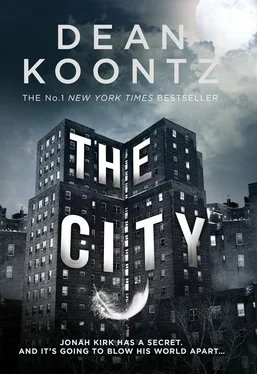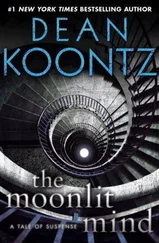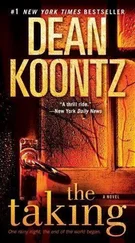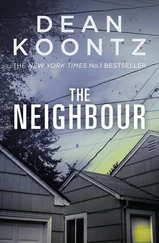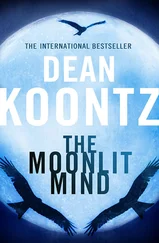Harper
An imprint of HarperCollins Publishers Ltd
1 London Bridge Street
London SE1 9GF
www.harpercollins.co.uk
First published by HarperCollins Publishers 2014
First published in the USA in 2014 by Bantam Books,
an imprint of The Random House Publishing Group,
A division of Random House, Inc., New York.
Copyright © Dean Koontz 2014
Cover design layout © HarperCollins Publishers 2014
Cover photographs © Mark Mahaney / Plainpicture (tower); Andy Roberts / Getty Images (feather); Shutterstock.com(moon)
Dean Koontz asserts the moral right to be identified as the author of this work.
Text design by Virginia Norey
A catalogue record for this book is available from the British Library.
This is entirely a work of fiction. The names, characters and incidents portrayed in it are the work of the author’s imagination. Any resemblance to actual persons, living or dead, events or localities is entirely coincidental.
All rights reserved under International and Pan-American Copyright Conventions. By payment of the required fees, you have been granted the non-exclusive, non-transferable right to access and read the text of this e-book on-screen. No part of this text may be reproduced, transmitted, down-loaded, decompiled, reverse engineered, or stored in or introduced into any information storage and retrieval system, in any form or by any means, whether electronic or mechanical, now known or hereinafter invented, without the express written permission of HarperCollins.
Source ISBN: 9780007520282
Ebook Edition © July 2014 ISBN: 9780007520275
Version: 2015-12-31
This novel is dedicated,
with affection and gratitude,
to Jane Johnson,
who is one continent
and one sea away.
And to Florence Koontz
and Mildred Stefko,
who are one world away.
Hold every moment sacred. Give each clarity and meaning, each the weight of thine awareness, each its true and due fulfillment.
—Thomas Mann, The Beloved Returns
Contents
Cover
Title Page
Copyright
Dedication
Epigraph
Prelude
Chapter 1
Chapter 2
Chapter 3
Chapter 4
Chapter 5
Chapter 6
Chapter 7
Chapter 8
Chapter 9
Chapter 10
Chapter 11
Chapter 12
Chapter 13
Chapter 14
Chapter 15
Chapter 16
Chapter 17
Chapter 18
Chapter 19
Chapter 20
Chapter 21
Chapter 22
Chapter 23
Chapter 24
Chapter 25
Chapter 26
Chapter 27
Chapter 28
Chapter 29
Chapter 30
Chapter 31
Chapter 32
Chapter 33
Chapter 34
Chapter 35
Chapter 36
Chapter 37
Chapter 38
Chapter 39
Chapter 40
Chapter 41
Chapter 42
Chapter 43
Chapter 44
Chapter 45
Chapter 46
Chapter 47
Chapter 48
Chapter 49
Chapter 50
Chapter 51
Chapter 52
Chapter 53
Chapter 54
Chapter 55
Chapter 56
Chapter 57
Chapter 58
Chapter 59
Chapter 60
Chapter 61
Chapter 62
Chapter 63
Chapter 64
Chapter 65
Chapter 66
Chapter 67
Chapter 68
Chapter 69
Chapter 70
Chapter 71
Chapter 72
Chapter 73
Chapter 74
Chapter 75
Chapter 76
Chapter 77
Chapter 78
Chapter 79
Chapter 80
Chapter 81
Chapter 82
Chapter 83
Chapter 84
Chapter 85
Chapter 86
Chapter 87
Chapter 88
Chapter 89
Chapter 90
Chapter 91
Chapter 92
Chapter 93
Chapter 94
Chapter 95
Chapter 96
Chapter 97
Chapter 98
Chapter 99
Chapter 100
Chapter 101
Chapter 102
Chapter 103
Chapter 104
Chapter 105
Chapter 106
Chapter 107
Chapter 108
About Dean Koontz
By Dean Koontz
About the Publisher
Malcolm gives me a tape recorder.
He says, “You’ve got to talk your life.”
“I’d rather live the now than talk about the was.”
Malcolm says, “Not all of it. Just the … you know.”
“I’m to talk about the you know?”
Malcolm says, “People need to hear it.”
“What people?”
Malcolm says, “Everybody. These are sad times.”
“I can’t change the times.”
Malcolm says, “It’s a sad world. Lift it a little.”
“You want me to leave out all the dark stuff?”
Malcolm says, “No, man. You need the dark stuff.”
“Oh, I don’t need it. Not me.”
Malcolm says, “The dark makes the light stuff brighter.”
“So when I’m done talking about the you know—then what?”
Malcolm says, “You make it a book.”
“You going to read this book?”
Malcolm says, “Mostly. Parts of it I wouldn’t be able to see clear enough to read.”
“What if I read those parts to you?”
Malcolm says, “If you’re able to see the words, I’d listen.”
“By then I’ll be able. Talking it the first time is what will kill me.”
My name is Jonah Ellington Basie Hines Eldridge Wilson Hampton Armstrong Kirk. From as young as I can remember, I loved the city. Mine is a story of love reciprocated. It is the story of loss and hope, and of the strangeness that lies just beneath the surface tension of daily life, a strangeness infinite fathoms in depth.
The streets of the city weren’t paved with gold, as some immigrants were told before they traveled half the world to come there. Not all the young singers or actors, or authors, became stars soon after leaving their small towns for the bright lights, as perhaps they thought they would. Death dwelt in the metropolis, as it dwelt everywhere, and there were more murders there than in a quiet hamlet, much tragedy, and moments of terror. But the city was as well a place of wonder, of magic dark and light, magic of which in my eventful life I had much experience, including one night when I died and woke and lived again.
When I was eight, I would meet the woman who claimed she was the city, though she wouldn’t make that assertion for two more years. She said that more than anything, cities are people. Sure, you need to have the office buildings and the parks and the nightclubs and the museums and all the rest of it, but in the end it’s the people—and the kind of people they are—who make a city great or not. And if a city is great, it has a soul of its own, one spun up from the threads of the millions of souls who have lived there in the past and live there now.
The woman said this city had an especially sensitive soul and that for a long time it had wondered what life must be like for the people who lived in it. The city worried that in spite of all it had to offer its citizens, it might be failing too many of them. The city knew itself better than any person could know himself, knew all of its sights and smells and sounds and textures and secrets, but it didn’t know what it felt like to be human and live in those thousands of miles of streets. And so, the woman said, the soul of the city took human form to live among its people, and the form it took was her.
The woman who was the city changed my life and showed me that the world is a more mysterious place than you would imagine if your understanding of it was formed only or even largely by newspapers and magazines and TV—or now the Internet. I need to tell you about her and some terrible things and wonderful things and amazing things that happened, related to her, and how I am still haunted by them.
Читать дальше
